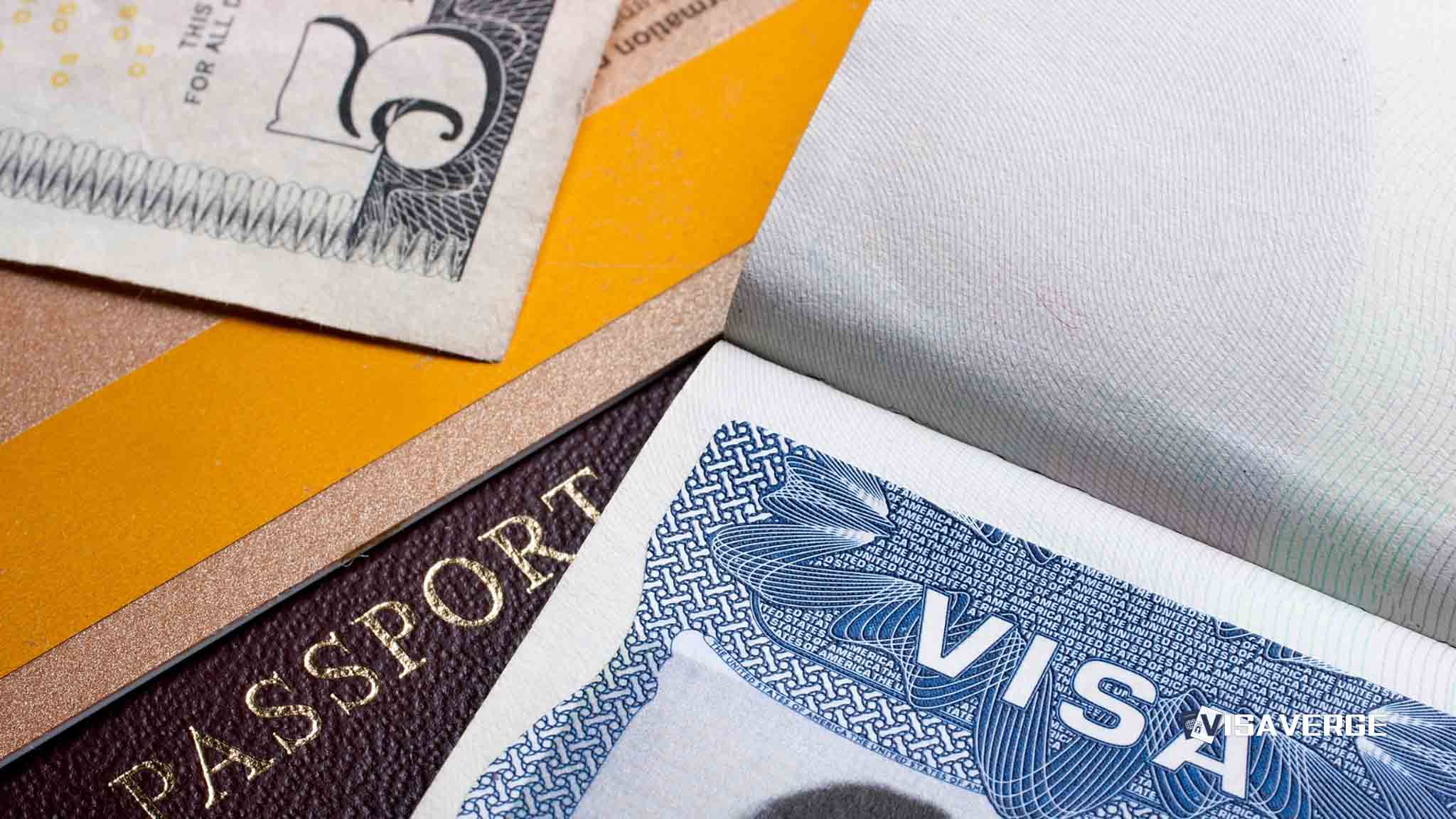(NEW DELHI, INDIA) The U.S. Embassy in New Delhi has revoked and denied visas for several Indian business executives and their close family members over alleged involvement in trafficking fentanyl precursors, the chemicals used to manufacture fentanyl. The embassy confirmed the move and said it falls under the U.S. Immigration and Nationality Act (INA) provisions on misrepresentation, criminal activity, and visa eligibility. Names of those affected were not released, citing privacy and ongoing investigations.
The action, which includes company-level flags for tighter screening, marks a fresh use of immigration tools to counter synthetic opioid supply chains impacting the United States 🇺🇸.

Basis for the Visa Actions
The embassy said consular officers carried out the visa revocation based on information from law enforcement and other agencies that connect certain executives and corporate leaders to fentanyl precursors destined for markets in the United States 🇺🇸 and Mexico.
Family members of those executives also face denials, and any future visa applications linked to them or their companies will draw added scrutiny. According to analysis by VisaVerge.com, this step extends consequences beyond the accused individuals to their immediate circles and business interests, tightening pressure on the entire supply chain.
Jorgan Andrews, the U.S. Chargé d’Affaires in New Delhi, underscored that the move aligns with policies first advanced under President Trump to secure borders and disrupt networks that move illicit drugs and their inputs. Embassy officials praised cooperation from Indian counterparts and said joint investigations would continue. Indian authorities did not issue an immediate public response.
Recent Criminal Cases and the Supply-Chain Focus
The action comes amid a widening U.S. strategy that targets both finished drugs and earlier stages of production, including sellers and brokers of fentanyl precursor chemicals.
- The U.S. Department of Justice previously named Gujarat-based Raxuter Chemicals and Athos Chemicals, along with an executive, Bhavesh Lathiya, for allegedly using mail and courier channels, mislabeled packages, and falsified customs forms to ship fentanyl precursors to the United States 🇺🇸 and Mexico.
- In a separate 2025 case, prosecutors charged Vasudha Pharma Chem Limited and senior employees with planning large shipments of the precursor N-BOC-4-piperidone to North America.
These cases reflect a clear focus on disrupting the chemical supply line that feeds illegal fentanyl production.
Policy Actions and Legal Basis
The embassy said the measures are grounded in the U.S. Immigration and Nationality Act, including grounds of ineligibility linked to controlled substance trafficking and misrepresentation. Officials pointed to provisions that allow consular officers to deny a visa or carry out a visa revocation when credible information shows involvement in drug trafficking or related criminal activity.
In practice, these tools let the State Department act quickly, even when criminal cases are still moving through courts.
Two sections are central to these decisions:
– INA § 212(a)(2)(C): Controlled substance traffickers (including those the consular officer “knows or has reason to believe” are traffickers or beneficiaries of trafficking).
– INA § 212(a)(6)(C): Misrepresentation and fraud in seeking a visa or admission.
Applicants refused under these provisions can face long-term or permanent bars. Family members may also be found ineligible if evidence ties them to benefits from trafficking or if they made misrepresentations during visa applications.
The Department of State explains how ineligibilities work, and when any waivers may be possible, on its official page: U.S. Department of State – Ineligibilities and Waivers.
The embassy’s step goes beyond the individuals. Companies tied to the affected executives are being marked in U.S. systems for tighter checks in consular processing and at ports of entry. That means longer timelines, extra document requests, and potential shipment delays if customs or other agencies need to verify end use and compliance.
Impact on Travelers, Families, and Companies
For travelers:
– Existing U.S. visas can be cancelled or revoked. After a visa revocation, the visa is no longer valid for travel, even if it appears unaltered in the passport.
– New visa applications may be denied or held for extra checks. Officers can ask for contracts, shipping records, company ownership charts, and proof of export compliance.
– Individuals flagged under INA § 212(a)(2)(C) or INA § 212(a)(6)(C) face steep barriers to future travel, with limited paths to relief.
For family members:
– Spouses and dependent children can face denials if officers find links to the activities or misstatements in applications.
– Family members are often drawn into the same review track as the principal applicant, increasing wait times and the chance of refusal.
For companies:
– Firms associated with the named individuals are likely to see:
– Delays or refusals in business visitor and work visa cases for staff.
– More questions on ownership, buyers, distribution networks, and end-users in the United States 🇺🇸.
– Added reviews of shipments, letters of credit, and customs filings.
– Logistics partners, brokers, and warehouse operators tied to such firms may also face inquiries about compliance programs and internal audits.
Industry lawyers in India advise chemical and logistics companies to review:
– Product catalogs for items that can serve as fentanyl precursors, even if they have legal uses.
– Export control classifications, end-user statements, and customer vetting procedures.
– Labeling, manifests, and customs declarations to ensure accuracy in every shipment.
– Staff training to spot red flags, such as unusual order sizes, rushed timelines, or routing through high-risk hubs.
Background, Outlook, and Practical Advice
The fentanyl crisis has reshaped U.S. policy. Fentanyl, a powerful synthetic opioid, is linked to large numbers of overdose deaths each year. While some related compounds have legal medical uses, illegal labs rely on fentanyl precursors shipped across borders.
Officials say suppliers may hide these chemicals in mixed cargo, mislabel packages, or route them through third countries to reduce the chance of seizure. The United States 🇺🇸 has added visa actions and trade measures to its enforcement toolkit, applying them to parties in multiple countries and now to Indian entities.
For Indian companies—particularly in pharmaceuticals, specialty chemicals, and shipping—this means:
– Higher compliance costs and more paperwork, but potentially reduced legal and reputational risk if compliant records are maintained.
– A stronger paper trail and tighter customer checks help legitimate exporters prove their case during consular interviews and shipment inspections.
– Many firms already keep batch-level records and end-use letters; consular officers may now ask to see them more often.
U.S. officials said they appreciate cooperation from Indian law enforcement, regulators, and customs. Joint work may expand to track source materials, shipping channels, and third-country intermediaries.
Industry groups in India worry that broad scrutiny could slow lawful trade, and they’re asking for clear guidance on what documents consular officers need and how long reviews may take. Advocates for stricter controls argue the extra checks are necessary to choke off chemicals that feed a deadly market.
Legal and Practical Steps for Affected Parties
For individuals and families facing a visa revocation or refusal under the U.S. Immigration and Nationality Act, legal options are narrow:
– Some grounds have no waiver at all; others have limited waivers with strict standards.
– Attorneys often recommend gathering thorough records: company registrations, supply contracts, invoices, chain-of-custody logs, and staff training materials.
– If there’s a criminal case, defense counsel and immigration counsel should coordinate, since statements in one setting can affect the other.
Embassy officials did not say how many visas were revoked or how many applications were refused. They also did not list the companies now flagged. That lack of public detail is typical in ongoing cases, especially where investigations are still active. What is clear is the direction of policy: the United States 🇺🇸 is pressing upstream to the chemical inputs and the business leaders who control them.
Key takeaways and recommended actions for exporters:
1. Know your customer, distributor, and end-user.
2. Keep records that prove lawful end use.
3. Avoid false statements on any customs or visa document—misrepresentation can trigger INA § 212(a)(6)(C) and long-term ineligibility.
4. Treat compliance as a core operational priority, not an afterthought at the shipping dock.
For Indian professionals with routine business travel to the United States 🇺🇸, consular interviews may now include more questions about job duties, client profiles, and product lines. Officers may request additional documents before making a decision. This does not mean every applicant in chemicals or logistics will face refusal, but the bar for trust is higher when products could be diverted to illegal drug production.
The embassy’s action highlights how immigration, public health, and national security policies now intersect: a decision at a consular window can ripple through corporate travel plans, supply agreements, and factory schedules. For families, a revoked visa can mean cancelled school years or delayed job starts—human costs that underline the need for early planning, honest applications, and strong compliance records.
Officials have not said whether more visa actions are imminent, but they signaled that reviews will continue. As cases like Raxuter Chemicals, Athos Chemicals, and Vasudha Pharma Chem move through courts, more names could be added to watchlists.
For now, companies with any exposure to fentanyl precursors should:
– Complete internal audits,
– Tighten documentation, and
– Prepare for consular and customs questions before they arise.
This Article in a Nutshell
The U.S. Embassy in New Delhi has revoked and denied visas for several Indian executives and their family members, alleging involvement in trafficking fentanyl precursors. The embassy cited information from law enforcement and other agencies and invoked provisions of the U.S. Immigration and Nationality Act related to controlled-substance trafficking and misrepresentation (INA §§212(a)(2)(C) and 212(a)(6)(C)). Companies linked to the affected individuals are being flagged for tighter consular screening, which can delay visas, require extra documents, and prompt shipment reviews. The actions extend consequences to families and business partners, and U.S.-India cooperation and investigations will continue. Affected parties are advised to compile export records, end-use statements, and thorough compliance documentation; legal relief options are limited depending on the grounds of ineligibility.












